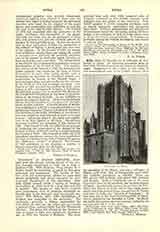

Avila (ABULA), Diocese of, a suffragan of Valladolid in Spain. Its episcopal succession dates at least from the fourth century and claims an Apostolic origin. Suppressed in the course of the ninth, it was reestablished early in the twelfth, century, after the expulsion of the Moors, and was a suffragan of Merida until 1120; then of Compostella until 1857. The Catholic population is 189,926. There are 360 priests, 339 parishes, and about 500 churches and chapels. Avila is historically one of the most important cities in the medieval and modern history of Spain. In the fourth century the archheretic Priscillian was Bishop of Avila, and in later times many saints had Avila as their home, among them St. Teresa and John of Avila, the “Apostle of Andalusia“. It was once one of the most flourishing cities of Spain, but its population has dwindled to 7,000. Its Moorish castle and ancient eleventh-century cathedral are monumental relics of the past.
THOMAS J. SHEEHAN
UNIVERSITY OF AVILA (1550-1807).—Under the patronage of Queen Isabella, the Dominicans established (1504) chairs of philosophy and theology in their College of St. Thomas at Avila, Spain. About 1550, the Papal Nuncio, Juan Poggio, raised the college to university rank. Gregory XIII, at the request of Philip II, ratified the nuncio’s action by the Bull “In Apostolatus culmine”, April 4, 1576. Innocent X, in 1645, approved the statutes of the university and empowered it to grant degrees in arts, theology, medicine, and law. Its work, however, was mainly theological. Though it enjoyed the favor of the Spanish sovereigns, especially of Charles II, it never attracted a large number of students. It had no endowment, but depended upon tuition fees. As a result, it began to decline during the eighteenth century, and it was suppressed, along with several other minor universities, in 1807.
E. A. PACE

